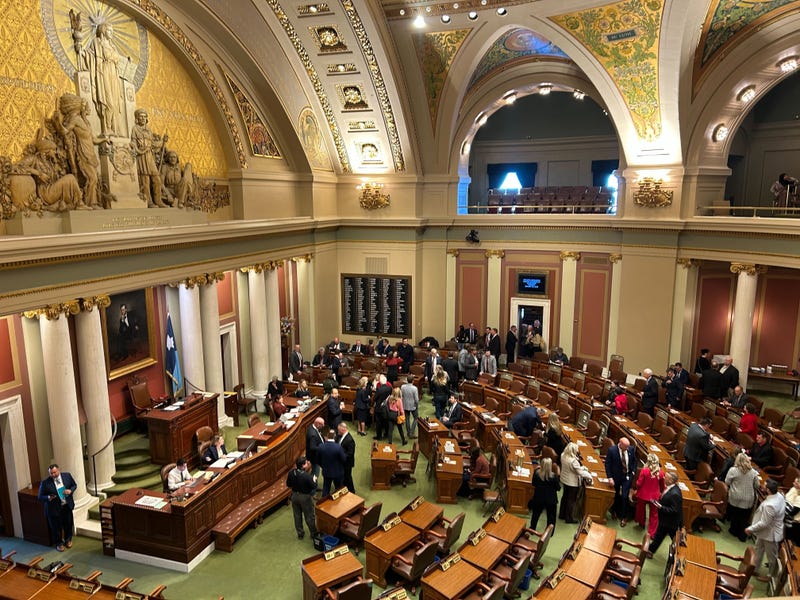
Minnesota lawmakers have struck a deal on a new two-year budget with the session deadline looming on Monday.
Minnesota Governor Tim Walz (DFL), Senate Majority Leader Erin Murphy (DFL- St. Paul), House Speaker Lisa Demuth (R- Cold Spring), and Speaker Emerita Melissa Hortman (DFL- Brooklyn Park) announced bipartisan budget targets at a Thursday morning press conference.
Senate Minority Leader Mark Johnson (R- Grand Forks), wasn't at the press conference and his signature is missing from the budget agreement signaling Johnson has not signed off on the budget “deal.”
Johnson, speaking on Thursday afternoon, clarified his thoughts saying there's more discussion to be had to get the budget to a place that reflects the values of everyday Minnesotans.
"It was a compromise where parties got together on both sides of the aisle and got that done," Johnson said. "I'm very hopeful that ultimately we do finish up on that, but we're going to be working with Democrats and Republicans, making sure the final outcome of that is something that reflects Minnesota's values."
But Walz and other DFL and GOP leaders were more than ready to say the deal on the budget is ready for finalizing.
“Amid partisanship and division in Washington, Republicans and Democrats are proving that here in Minnesota we can still work together to get things done,” said Walz in a statement. “This agreement will ensure Minnesota continues to be the best place in the country to raise a child, while responsibly addressing long-term structural budget challenges."
WCCO political analyst Blois Olson notes the new budget targets still leaves a $2 billion shortfall in the next budget. Demuth says it’s the largest cut in state spending in history, with about $5 billion coming off the budget.
"I am very proud of the work we've done so far. Minnesotans will be able to afford their lives here," says Demuth.
The last two weeks have been filled with negotiations between all of the legislative leaders and the governor as the two sides work on a compromise for the state's spending package for the next two year cycle.
"This was a hard one with hard issues," said Walz who said he may not agree with every detail in the budget, but said he does agree with the compromise that got it done.
Despite the potential agreement, the details likely will need a special session due to the Monday deadline. The governor would need to call that special session.
"In 2019 we had a one-day special session. It is my hope we can wrap up our work by Monday, or a one-day special session," said Hortman.
Demuth also said what was certainly a product of the tie between Democrats and Republicans in the House, unhappiness by both sides on the final product. While both sides said they're happy with the compromise and getting a deal done, it also meant both sides needed to give in order to reach this agreement.
"Am I happy with all of this? No," Demuth said.
One of the biggest talking points between the two sides when it comes to compromise was ending the coverage of health insurance for illegal immigrants in Minnesota. They will continue to provide reimbursement for healthcare for children, but adults will no longer be covered by the state.
"State government is finite and we make these choices, but to preserve the functioning of state government, to preserve health care for everyone else being delivered when it should be delivered and how it should be delivered, we did make this compromise with the Republicans," added Hortman.
A recent update from the Minnesota Department of Health finds the state’s decision to provide free health care to illegal immigrants has become much more costly than anticipated. According to the Minnesota Department of Health, 17,396 illegal immigrants are now enrolled in MinnesotaCare, more than twice the original estimate of 7,700.
"This is pulling a thread from a very tenuous health care system, especially in rural communities, but this is a compromise," said Sen. Murphy.
Demuth did note that part of the compromise by the GOP was leaving coverage for children.
"So, adults on MinnesotaCare as undocumented, that will come to an end," Demuth said. "Children that are undocumented that are on MinnesotaCare, that will be allowed to continue. It's not a measure of being uncaring, it's a fiscal issue."
The budget proposals will now go to committees to hash out the final details.
"I'd like to really thank the governor for his leadership in these negotiations, keeping us all focused on the end goal of fiscal responsibility, and having those hard conversations and getting us through the hard things," noted Hortman.
The new budget is expected to be much less robust than the last one, passed by a DFL-trifecta in 2023. The state had over a $17 billion surplus to play with at that time, but lawmakers are now looking at a future deficit making it necessary to rollback those spending initiatives.
"While we disagree on many things, every person in the negotiating room has the best interest of our state in mind," the governor continues. "I want to thank House Speaker Lisa Demuth and Speaker Emerita Melissa Hortman, as well as Senate Leaders Erin Murphy and Mark Johnson, for bringing their passion and ideas to the room and working in good faith to improve the lives of the people we serve.”
This is a developing story - stay with WCCO Radio for more information.
